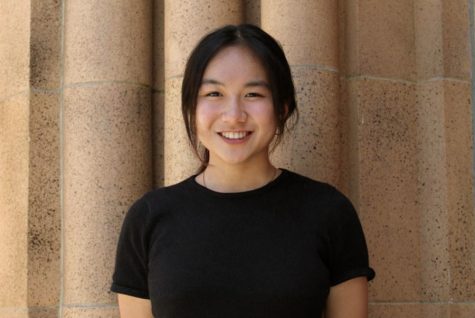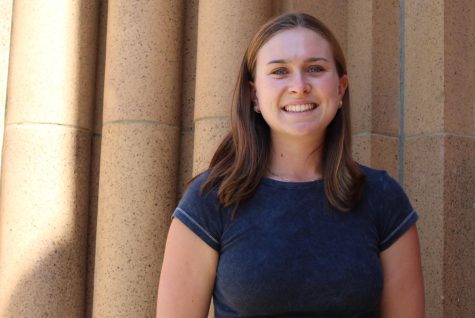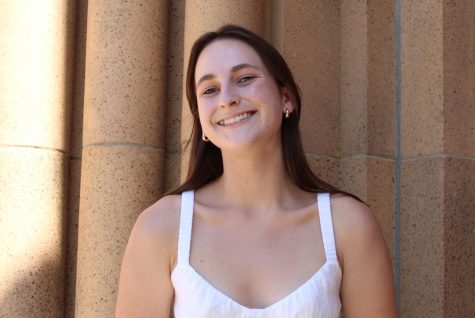Making Family History
First-generation seniors tackle college application without family guidance
I didn’t know anything. I didn’t know what FAFSA was and I didn’t know about financial aid. I didn’t know that you would meet with a counselor to go over what classes you should take.”
These are the experiences of Crystal Laguna, a College Pathways counselor at Paly’s College and Career Center who works with “first-gen” students—high school seniors who are the first generation in their family to attend college. As a former first-gen student herself, Laguna understands the struggle of applying to colleges without family guidance. Now, she’s committed herself to advising current first-gen students to help demystify the process and provide foundational support.
“[As] the youngest of five kids, my oldest sister was the only one who went to community college and then did an online program,” Laguna said. “So she was the one who was trying to push [me] to go to college.”
After navigating the application process solo, Laguna had to choose college classes from a catalog at community college. Thanks to the help of advisors, she was able to transfer to University of California Los Angeles and later complete her Master’s in Education at San Jose State University. However, she still wishes she had received more support for the college process during high school.
“I couldn’t even tell you what my school counselor looked like,” Laguna said. “There was a lot that I didn’t know, but I didn’t know what I didn’t know.”
When Paly senior Mia Rose Tuifua began her college application process, she encountered the same problem. She learned on the fly that the college application process is complex and nuanced, with its own nomenclature, deadlines, and varied platforms and systems. Perhaps even more daunting is the task of researching and selecting the right mix of reach and reasonable schools to apply to and in what order. Should you apply Early Decision 1 or Early Action? What is the difference between binding and restrictive Early Action? Should you reach for your dream school or go for the safer bet?
“Most Paly kids are not first-gen so everyone assumes that we know all this [college admissions information] already,” Tuifua said. “I had no idea where to apply. I didn’t know what the Common App was.”
Another major barrier was the expensive application fees, especially those for the University of California and California State schools.
“I had to pay for all of my college applications with money that came straight from my paycheck, so I was limited to around three colleges,” Tuifua said.
Tuifua tries not to compare herself to non-first-gen students, but can’t help to imagine how at-home support would have made the application process easier.
“My parents think that I can get into Oxford easily, because they don’t know the difference between colleges,” Tuifua said. “Sometimes I think what senior year would’ve been like for me if I had two parents who went to college, who knew how rigorous this process is, and someone to help me go through this because all the support I have is at school.”
While Tuifua emphasized how much she appreciates Paly’s support, she still believes that more resources could be allocated to support first-gen students going through the process.
“I think that it’s great that we have meetings for first-gens so that they can tell us how to go through the college application process,” Tuifua said. “However, I think it should probably be once a week if not twice, and I think that [counselors] should be more available.”
Some students shy away from seeking resources because they want to avoid being labeled. It can be difficult to step forward and acknowledge that you would benefit from additional support.
“[Students] don’t want to have that label because they think it’s maybe something negative, but it’s actually something positive,” says Laguna. “It’s saying that you’re changing the trajectory of your family.”
Tuifua also suggested setting aside a counselor just for first-gen students, who currently have to share meeting time with non-first-gen students, and alerting students about deadlines earlier on in Advisory.
“I would say go to every single advisory,” Tuifua advises. “Go to all of the first-generation student meetings that Ms. Laguna holds, and use their resources to your advantage because Paly does have a lot of resources for you.”
Print Issue
Please click on the three vertical dots on the top right-hand corner, then select “Two page view.”

2020-2021 - Staff Writer
2021-2022 - Digital Design Editor
2022-2023 - Creative Advisor
I joined C-Mag because of our amazing page designs and...

2020-2021 - Staff Writer
2021-2022 - Staff Writer
2022-2023 - Social Media Manager
I joined C mag to meet people. My favorite part of C mag is...

2021 - 2022 - Staff Writer
2022-2023 - Social Media Manager
I joined C-mag to be part of a writer's community. C-Mag has such an impressive combination...







